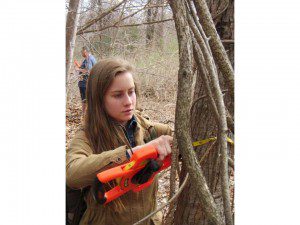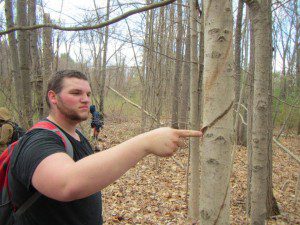WESTFIELD – Students in the Environmental Science and Biology Departments at Westfield State University are being challenged by their professors to do something that matters.
Dr. Tim Parshall, professor of biology, and Dr. Michael Vorwerk, chair and professor of environmental science, are motivating their students to combat invasive species that are killing trees on Westfield State property between the university and route 20.
Vorwerk says that he has been using the property, which measures about 20 acres in size, as a teaching tool in his classes for almost 14 years.
“Students, faculty, and volunteers have done a lot of work putting in and maintaining an improved trail system during this time,” said Vorwerk.
Part of the work of cleaning up the university’s wildlands has been taken on by students in Vorwerk’s and Parshall’s classes. To prompt students to take part in activities that benefit the environment, Vorwerk created a new requirement for his Principles of Environmental Science course. The new addition to the class’ curriculum requires students to do “something that matters – something to help the environment,” according to Vorwerk. Vorwerk’s idea allowed students to select from a few options as to how they wanted to help the environment, but most students chose to spend a class releasing the trees in the wildlands from an invasive species known as oriental bittersweet.
Vorwerk wanted a way to have students improve their community, but he also wanted to combat some of the negativity that can surround a conversation about the state of the environment.
“With all the doom and gloom you hear about the environment and environmental problems, I think it’s important for students to take part in making a positive change – to realize that their actions matter,” Vorwerk said.
Parshall also brought students to the wildlands to cut vines away from trees. A year and a half ago, Parshall and his students freed 15 trees from the oriental bittersweet vines.
“Last fall we revisited these trees and they are looking much healthier now,” Parshall said. “More importantly, the bittersweet vines didn’t sprout back as much as we thought they would.”
According to Parshall, the oriental bittersweet’s first recorded occurrence in Massachusetts was in 1919 and it likely came from China to the U.S. as an ornamental plant around 1860.
For the past three years, Parshall has been bringing his environmental senior seminar students to the university wildlands as part of an ongoing research project where environmental science seniors look at methods for controlling invasive species. Under Parshall’s mentorship, two senior environmental science students, Ella McPherson and Josh Perry, have been working on an invasive species management plan. In consultation with Julie Richburg, the Trustees of Reservation Ecologist for Western Massachusetts, McPherson and Perry recently formalized and submitted the plan to the Westfield Conservation Commission. If approved, the plan will allow Westfield State students to control invasive species, like the oriental bittersweet, in the main wetland area. Wetlands are protected in Massachusetts under the Wetlands Protection Act which states that any activities that could impact a wetland complex must first be reviewed by the town conservation commission.
Parshall said he is eager for the plan to be approved so the work of clearing the wetlands can begin.
“I am really excited about this project because there are a lot of opportunities for students to get involved in real-world questions and research,” Parshall said. “This is just the start of a project that will continue for many years.”
Parshall is hopeful that the university wildlands and the invasive species present there can be used as a teaching tool.
“I’m looking at this site as an outdoor research lab where students from many different classes can visit and take part,” he said.




